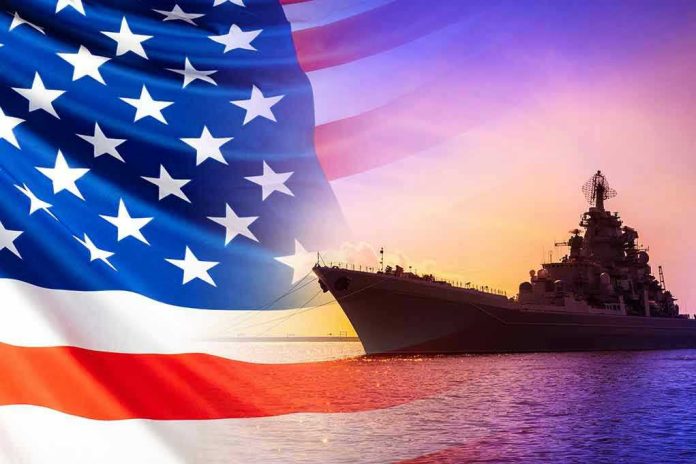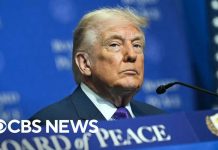
For the first time in decades, U.S. warships and aircraft are patrolling the Southern Caribbean, as President Trump’s administration declares Latin American drug cartels global terrorists and orders direct military action—sparking both hope and alarm across the hemisphere.
Story Highlights
- U.S. military forces have deployed to the Southern Caribbean to target drug cartels labeled as terrorist organizations under a new Trump directive.
- This marks an unprecedented escalation in American counter-narcotics strategy, expanding military scope beyond advisory roles.
- The Pentagon’s move aims to disrupt cartel operations, secure borders, and protect U.S. national interests against transnational threats.
- Regional reactions are mixed, with some governments cooperating and others, like Venezuela, warning of sovereignty violations.
Trump Orders Military Action Against Cartels Declared Terrorists
President Donald Trump has authorized the deployment of U.S. air and naval assets to the Southern Caribbean Sea, escalating the nation’s fight against Latin American drug cartels. This historic decision follows the administration’s February 2025 designation of major cartels—including Mexico’s Sinaloa and Venezuela’s Tren de Aragua—as global terrorist organizations. By using this legal classification, the Trump administration has expanded the operational scope for American military intervention, signaling a hard line on border security, national defense, and the protection of American communities from cartel-driven violence and narcotics.
This deployment is a direct response to mounting domestic pressure over unchecked drug trafficking, illegal immigration, and the economic destabilization caused by cartel operations. The Pentagon began deploying warships and surveillance aircraft in August 2025, with the goal of interdicting narcotics shipments and dismantling criminal networks operating along critical Caribbean transit routes. The Southern Caribbean, including Venezuela’s northern coast and adjacent waters, has become a strategic focus due to rising cartel activity, weakened state control, and the region’s importance as a conduit for illicit goods heading toward the United States.
Historic Shift in U.S. Counter-Narcotics Tactics
Unlike previous U.S. operations in Latin America, which often limited the military to advisory or humanitarian roles, the current deployment marks a decisive shift to direct engagement. Past efforts, such as Plan Colombia, relied on local law enforcement and intelligence cooperation. Now, American forces are empowered to take active measures against non-state criminal organizations, reflecting a new era in counter-narcotics and border enforcement. At least two U.S. warships have been dispatched for maritime interdiction, with expanded security agreements now in place with regional allies like Ecuador, Guyana, and Brazil.
This escalation is designed to send a clear message: the United States will not tolerate threats to its sovereignty, public safety, or economic interests from transnational crime. Official statements from the Trump administration emphasize the urgency of combating “specially designated narco-terrorist organizations” that exploit weakened borders and fuel the ongoing crisis of illegal immigration and fentanyl-related deaths. While operational specifics remain classified, the scale of deployment and coordination with allies indicate a robust, multi-layered approach to neutralizing cartel influence.
Regional Response and National Security Implications
Reactions among Latin American governments are divided. While some nations have welcomed U.S. support in restoring security and disrupting criminal economies, others—most notably Venezuela—have condemned the operation as an infringement on national sovereignty. Analysts warn that these tensions could escalate, especially if U.S. forces confront cartel-linked vessels or encounter resistance from local actors. Nonetheless, the Trump administration maintains that decisive action is necessary to protect American lives and uphold the rule of law.
Experts in defense and regional policy describe the deployment as a “seismic shift” in U.S. strategy, blending counter-narcotics operations with efforts to secure critical resources and deter illegal migration. The move also sets a precedent for using military power against non-state actors, with potential long-term effects on U.S. influence in Latin America, defense industry growth, and regional stability. The operation’s success will likely depend on sustained intelligence gathering, cooperation with local partners, and careful diplomatic management to avoid unintended escalations.
U.S. Deploys Forces To Take On Latin American Drug Cartels In The Southern Caribbean https://t.co/wx04khfUl9
— Everett, West Seattle (@EverettRockford) August 14, 2025
Short-term impacts include heightened military activity in the Caribbean, possible confrontations at sea, and disruptions to drug trafficking routes. Economic ripple effects are already being felt in commodity markets, and U.S. defense contractors are experiencing a surge in demand for surveillance technology and naval assets. While supporters hail the move as a long-overdue stand for American security and sovereignty, critics caution against the risks of militarizing drug policy and provoking regional backlash. For now, the Trump administration’s bold stance has placed the United States at the forefront of a new chapter in the war against organized crime and border insecurity.
Sources:
U.S. Deploys Forces To Take On Latin American Drug Cartels In The Southern Caribbean
Military Expansion in the Southern Caribbean: Strategic Shift Reshaping Commodity & Defense Markets
U.S. Southern Command: Continuing Promise 2025









